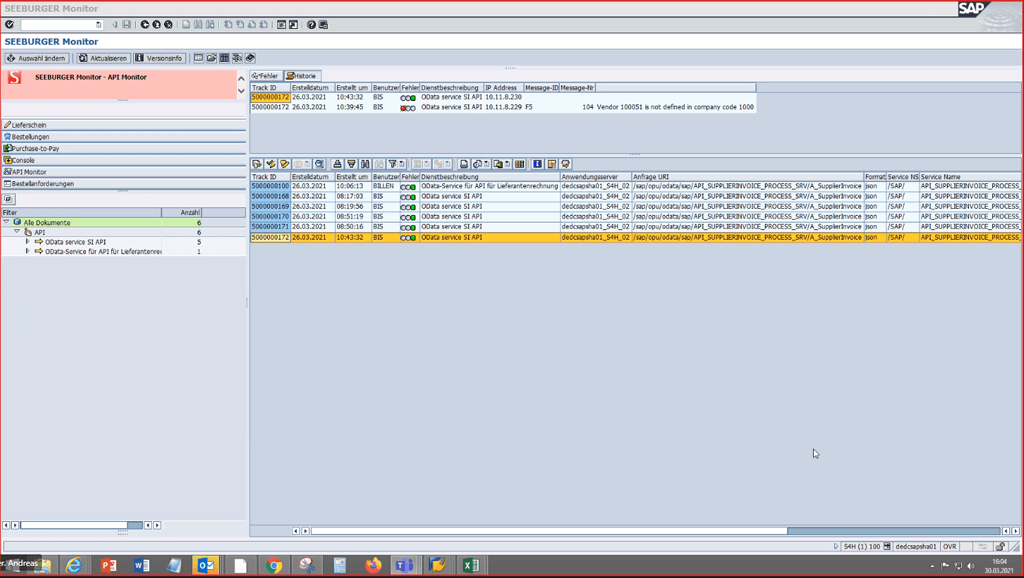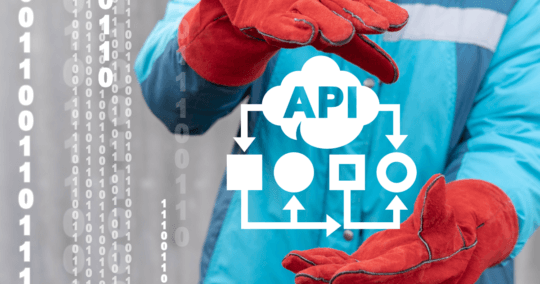API Integration is the Key to Modern Supply Chain Communication

Portals such as SAP Ariba, Jaggaer, Coupa, SupplyOn and OpenText enable vendors to conduct their commercial processes electronically, from purchase orders to invoices. If you add in an integration platform and APIs, these processes can be made even more efficient and cost-effective, as asynchronous EDI solutions can be supplemented with components capable of operating in real time. SEEBURGER’s API integration solution is a flexible application that can be operated by the departmental users themselves. This is the key to modern supply chain communication.
Digitalisation of the supply chain in mechanical and plant engineering
Ever more customers are expecting their suppliers to use portals such as SAP Ariba, Jaggaer, Coupa, SupplyOn, OpenText etc. This has certain advantages for the suppliers:
- The ability to receive incoming orders automatically
- The ability to send order confirmations, invoices, etc. digitally
- Efficiency gains through shorter processing time
Many of these portals offer vendors multiple options through which they can receive orders and create order confirmations, shipping notifications, invoices, etc. In addition to email, online or direct connection via cXML, electronic transmission via an integration platform via EDI (Electronic Data Interchange) or web services is a good way to increase efficiency, reduce costs and grow sales.
For over 30 years, EDI has been the standard for a paperless exchange of structured data between business partners. Initially focussed on large companies, many medium-sized machine and equipment manufacturers now also use EDI to electronically exchange documents with their trading partners. However, EDI data is provided asynchronously, i.e. not in real time. Therefore, many companies have been looking for a simple, fast complement or alternative, especially for time-critical processes, in order to integrate their customers and suppliers even more easily.
One such alternative is to use APIs (Application Programming Interfaces), which enable data exchange in real time. Data communication via APIs, essentially ʽthe 21st century EDIʼ, enables a completely new type of business model based on real time data integration between applications and cloud services.
One example for this is accessing your warehouse’s inventory information. By employing an API to integrate this data, it is possible to call up this information in real time while the customer is placing his order to give definitive information on e.g. how long it will take to deliver the product.
Many companies in the machine and plant engineering sector are currently being confronted by the increased expectation to integrate customer/supplier portals, as described above. Since the use of some of these portals carry costs for suppliers, introducing them needs to be considered from an economic point of view and their feasibility compared to the costs of conducting the process manually. Sending an invoice (for spare parts or complete machines) in structured form from the ERP system to a portal requires the use of interfaces, and recently APIs have been increasingly used for this purpose.
API integration makes it easier to access customer portals
In his blog post API Integration and API Management in Mechanical Engineering, Michael Dobrindt describes in detail how APIs can be employed in plant and machine engineering along the entire supply chain. In both sales & distribution and after-sales, APIs enable you not ony to offer and employ smart services but also to quickly and easily integrate customers‘ wishes such as connecting to a customer portal.
APIs therefore offer you an alternative – or complementary – way of integrating business partners and strengthening your relationship with them. API integration, alongside the accompanying monitoring tools, add genuine value to your proceses and make it easier to access customer portals. Ideally, an API integration solution, in conjunction with the use of a hybrid integration platform (SEEBURGER BIS), provides a flexible application that is managed by central IT but can be operated by the business units in contact with customers, such as sales.
API monitor for monitoring incoming anf outgoing APIs
The use of a monitoring tool such as the SEEBURGER API Monitor is ideal if also using SAP add-ons. In enables electronic documents to be monitored in an SAP-integrated manner and, if necessary, corrected immediately by the employees in the relevant department. Using these monitoring tools has the following advantages for users:
- Full real-time monitoring of API documents (including stutus reports),
- Status-based automatic alerts for errors, rejection, etc.
- Seamlessly logged corrections of rejected/non-correct invoices

Conclusion
The portals described above, such as SAP Ariba, Jaggaer, Coupa, SupplyOn, OpenText, enable suppliers to handle their commercial and administrative processes electronically, from order to invoice. Using an integration platform together with APIs helps to increase efficiency, reduce costs and grow revenues. Furthermore, SEEBURGER’s API integration solution is a flexible system that can be operated by the departmental users themselves (in our case, sales).
This is the key to modern supply chain communication.
How can SEEBURGER help?
With its Business Integration Suite and the API, B2B/EDI and MFT solutions based on it, SEEBURGER offers a central business integration platform that can easily handle all these requirements comfortably and securely. There is also a range of B2B integration solutions for SAP users you can add in for issues such as e-invoicing (ZUGFeRD), purchase-to-pay, or an API monitor for documents.
Thank you for your message
We appreciate your interest in SEEBURGER
Get in contact with us:
Please enter details about your project in the message section so we can direct your inquiry to the right consultant.
Written by: Martin Schmitt
Martin Schmitt joined SEEBURGER in March 2016 as Sales Manager in the area of mechanical and plant engineering for Germany. Martin has been working in customer consulting since 2003 and has gained a lot of experience in supporting customers and interested parties in complex processes. In his leisure time, he enjoys to listen to electronic music, sing in the gospel choir, or go hiking with his family.





